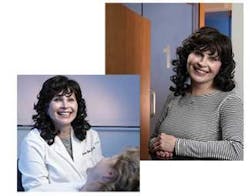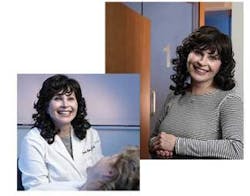Iris
October celebrates increased awareness of breast cancer and dental hygiene. As you read this story of a remarkable hygienist battling breast cancer, do yourself a favor and get checked.
Breast cancer is second to heart disease as a cause of death among women. The American Cancer Society estimates that in 2006 more than 41,000 women will die of breast cancer. Every one in eight women will be affected with the disease.
We never think it will happen to us.
Recently, I had the opportunity to chat with Iris Hunter, RDH. Iris is one of many brave women who have been diagnosed with breast cancer and is currently undergoing treatment.
Part of her courage is demonstrated by the fact that she still practices five days a week when she feels well enough to go to the office.
She wanted to do this interview because she felt it so important to tell her story in hope of motivating her colleagues of the necessity to have annual exams.
Iris, who is 53 years of age, has been a clinical hygienist for 31 years. She has been in her current position of 16 years working for Dr. William Dorfman in Century City, Calif. Iris’ love of hygiene, the interaction with her patients and colleagues, and her devoted boyfriend have all provided her with strength that she has exuded throughout this ordeal. Here is her story.
Q: Do you have any family history of breast cancer?
Iris: No, there is no history that I am aware of.
Q: Did you go for annual check-ups?
Iris: Yes. I have been very conscientious about having annual check-ups and mammograms since I was 35 years old.
Q: How did it happen that you went for a different type of mammogram?
Iris: Most of the mammograms that I received in the past were screening mammograms. This type of mammogram is the conventional mammogram that is usually performed. It is a low-dose X-ray examination and shows two views of the breasts. However, this year someone close to me suggested that I have a digital diagnostic mammogram. This is a different type of mammogram from the screening mammogram in that it shows additional views of the breasts and can pinpoint an exact location and the size of an abnormality. It also shows the surrounding tissue and the lymph nodes. I had this digital diagnostic mammogram performed at a different facility than my previous mammograms. I also received a referral for a particular radiologist to interpret the mammogram and write the report.
Q: How did you find out that you had breast cancer?
Iris: It was a Tuesday when I had the diagnostic digital mammogram. This resulted in questionable findings. The very next day (Wednesday) I returned for a mammogram and an ultrasound of only my right breast. This test resulted in suspicious findings. Thursday of the same week I had an ultrasound guided needle core biopsy of my right breast and the specimen was immediately sent to pathology for diagnosis.
That Friday the pathology results came back confirming infiltrating ductal carcinoma in my right breast.
I found out from my boyfriend who had called the doctor to get the pathology report. After he spoke with the doctor, he called me at work to give me the results.
Q: What first ran through your mind after receiving the news?
Iris: Upon learning of my diagnosis, I felt surprised, upset, and fearful, not to mention the great uncertainty that I felt about my future.
Q: Did you have confidence in the doctor who gave you the results?
Iris: Yes, I had great confidence in all of the physicians who were involved.
Q: Did you get a second opinion?
Iris: No, I did not feel that I needed a second opinion of the pathology results. I did, however, seek out multiple opinions with respect to my treatment including surgery (lumpectomy), chemotherapy, radiation, and related treatments.
Q: What process did you go through to find your doctors?
Iris: I had excellent referrals from several sources - mostly from people who I knew were qualified and whom I respected.
Q: Did you begin researching the disease after you had been diagnosed?
Iris: Oh, absolutely. I did extensive research through people who I knew were well informed and educated about the disease. I also realized that the Internet was a vast source of information not just on breast cancer, but all types of cancer. The Internet was very helpful in obtaining answers.
Q: What regimen of treatment are you on?
Iris: I had a lumpectomy and the removal of some of my lymph nodes. This was followed by chemotherapy (adriamycin and Cytoxan) once every three weeks for a total of four treatments. I am currently still undergoing the chemotherapy. Once I finish this, I will begin radiation five days per week for a total of seven weeks. Finally, I’ll be put on medication, Arimidex, for five years.
Q: What effects did the chemotherapy have on your system?
Iris: The chemotherapy caused complete hair loss some weeks after the first treatment. It also causes severe nausea and vomiting for days after each treatment. I have also experienced considerable fatigue and have had a medicinal/chemical taste in my mouth.
Q: You decided to remain working in the dental office while going through treatment. How has this affected you?
Iris: Although I should have taken a leave of absence, I elected to attempt to work as much as possible. I feel that it is important to my overall health and well-being to have my life operate as normal and productive as possible during these times. I have lost many hours of work, though, because of the scheduling of my treatments and, of course, the side effects of the treatments.
Q: Have you joined a cancer support group?
Iris: No, I haven’t joined a support group, although I think they are wonderful. I’ve received incredible support and love from many people in my life.
Q: How have your colleagues been supportive?
Iris: My colleagues have been extremely supportive. They have been so caring and concerned. They regularly inquire on my well-being and many of them call me at home to make sure I’m doing OK. They have also accommodated and understood my needs involving the necessary changes to my work schedule.
Q: Who else has been pivotal in offering you support during this ordeal?
Iris: My boyfriend, Robert, has been my rock. He has taken me to all of my appointments and has been by my side every moment along the way. The depth of his love is immeasurable and I’m sure I wouldn’t be able to cope if it were not for him.
Q: If you were to relay a message to the readers of RDH magazine, what would that be?
Iris: I would have to tell the many readers of RDH to be extremely diligent in going for annual exams. I would recommend that they opt for a digital diagnostic mammogram every year without delay or exception. Be proactive about your medical care and in the role that you play with doctors, radiologists, facilities, and equipment involved in your medical care and/or treatment. Finally, I would advise that they also be proactive and involved in the selection process of all of the aforementioned.
This is a curable disease if detected and treated in the early stages.
As Iris stated, breast cancer can be treated with success if it is detected early. The five-year relative survival percentage for women who have had breast cancer is approximately 88 percent. Early detection and treatment is key. Iris certainly gave me the motivation to be more disciplined when it comes to scheduling my annual exams, and, hopefully, her candidness will motivate you as well.
October is National Breast Cancer Awareness Month as well as National Dental Hygiene Month. Both Iris and I challenge you to make that appointment and to share her story of courage and the importance of keeping a positive attitude if one is unfortunate to be diagnosed with the disease. Iris is a remarkable woman both professionally and personally. I wish her the very best.
For more information or to make a contribution, please visit the American Cancer Society (www.cancer.org), the National Breast Cancer Foundation (www.nationalbreastcancer.org) and the Susan G. Komen Breast Cancer Foundation (www.komen.org).
Therese (Tree) Mainella, CDA, RDA, has been in the dental industry for 30 years as a chairside dental assistant and later in the corporate sector, holding positions in brand management and marketing for various dental companies. She received her certification for dental assisting through the University of Connecticut Health Center and Tuxis Community College. She is also a registered dental assistant in the state of California where she resides and is currently completing her bachelor’s degree in business administration through Nova Southeastern University-Wayne Huizenga School of Business in Florida. Tree is the Director of Marketing for DUX Dental in Oxnard, Calif.

